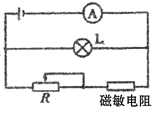问题
选择题
.已知磁敏电阻在没有磁场时电阻很小,有磁场时电阻变大,并且磁场越强阻值越大.为探测磁场的有无,利用磁敏电阻作为传感器设计了如图所示电路,电源的电动势E和内阻r不变,在没有磁场时调节变阻器R使电灯L正常发光,若探测装置从无磁场区进入强磁场区.则
A.电灯L变暗
B.电灯L变亮
C.电流表的示数增大
D.电流表的示数减小
答案
BD
进入磁场区后,磁敏电阻阻值增大,由于电源电动势E和内阻r不变,则路端电压增大,从而灯L两端的电压增大,电灯L变亮,B正确;但同时由于电路的总电阻增大,故电路中总电流减小,电流表示数减小,D正确。
